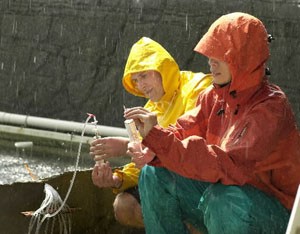Global Effects: Investigating Air-Water Gas Exchange Transfer of heat, mass, and momentum across the air-water interface is a result of many physical, chemical, and biological factors that occur at the water surface. Understanding the principal factors controlling air-water fluxes is crucial in determining how surface processes regulate the variability of climate, weather, and biological activity. Particularly when estimating the global carbon balance and predicting the amount of carbon dioxide in the atmosphere, accurate quantification of gas exchange at the air-water interface is needed. Dr. McGillis specializes in understanding the physical processes that occur at the air-water interface. His research has included numerous cruises to ocean areas that act as sources and sinks for carbon dioxide and other gases as well as the development of the Martha's Vineyard Coastal Observatory. Currently, Dr. McGillis is focusing on coastal, lake, riverine, and estuarine air-water exchange to determine how these areas affect the global carbon budget. He is also a Surface Ocean Lower Atmosphere Study (SOLAS) committee member and is collaborating with scientists in the development of an international SOLAS summer school. His technical background centers on physicochemical flow, including the transport of heat and mass associated with phase-change processes, the thermodynamics of two-phase and fluid-phase equilibria, the mechanisms of evaporation, condensation, nucleation, bubble growth and two-phase fluid flow, and the fundamentals of turbulence. Dr. McGillis has investigated these processes in field experiments and theoretical models, while helping to develop new direct covariance methods of measuring gas transfer. Measurements of gas transfer, surface statistics, and surface concentrations will lead to a better understanding of air-water gas transfer, which is necessary for accurate climate modeling. The challenge in this work is in deciphering the magnitude of parameters affecting gas transport mechanisms. Dr. McGillis has addressed many fundamental transport issues in vapor-liquid systems with differential diffusion, and is continuing to address gas transport at the air-water interface on a global level. |
